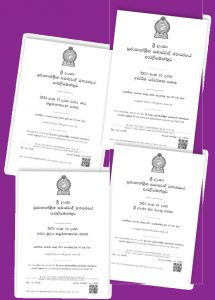 Since gaining independence, successive Presidents have implemented various policies under different governments. However, with each change in Government, these policies shifted, leading to a lack of a consistent national policy — ultimately resulting in the country’s bankruptcy.
Since gaining independence, successive Presidents have implemented various policies under different governments. However, with each change in Government, these policies shifted, leading to a lack of a consistent national policy — ultimately resulting in the country’s bankruptcy.
As a result, Sri Lanka’s political culture evolved around shifting governments based on ideologies related to the implementation or non-implementation of policies. This led to presenting patchwork solutions to the public, all with the aim of winning elections.
President Ranil Wickremesinghe, who courageously took on the immense challenge of rebuilding the country after its collapse into bankruptcy, swiftly entered into a comprehensive loan agreement with the International Monetary Fund (IMF) to manage the economy in the short term according to its terms.
Drawing on international experience and expertise, and with IMF support, he established the Official Creditor Committee (OCC), composed of Japan, France, and India, to restructure foreign debt with the involvement of specialised academic institutions.
Following this, the Paris Joint Assistance Group, the People’s Republic of China, and other foreign countries signed the debt repayment plan after the restructuring. The international community urged the national leadership to enshrine these agreements, to rescue the country, into the country’s law.
In 2024, in line with international agreements, a significant economic transformation will be undertaken to ensure debt sustainability, reduce poverty, and establish a national agenda for achieving developed country status by 2048.
This plan has been formalised through the Economic Transformation Act, securing it as the country’s future direction. Regardless of changes in Presidents or governments, a long-term national policy is now enshrined in law by the legislature.
These five key laws, considered the talismans that safeguard and build the nation, are:
1. The new Central Bank of Sri Lanka Act (No. 16 of 2023), which prohibits money laundering.
2. The Public Debt Management Act (No. 33 of 2024), which prevents arbitrary borrowing at exorbitant interest rates.
3. The Fiscal Management Act (No. 44 of 2024), which prevents the inclusion of false promises in the budget to mislead the public.
4. The Economic Transformation Act (No. 45 of 2024), which aims for a sweeping transformation across the country’s agriculture, industry, services, foreign investment, and free trade areas.
 5. The Anti-Corruption Act (No. 28 of 2023), which establishes strict legal frameworks to eradicate corruption and hold all parties — including politicians, government officials, trade unions, media organisations, private sector companies, and directors — responsible and accountable.
5. The Anti-Corruption Act (No. 28 of 2023), which establishes strict legal frameworks to eradicate corruption and hold all parties — including politicians, government officials, trade unions, media organisations, private sector companies, and directors — responsible and accountable.
National policy
Ranil Wickremesinghe is the sole candidate in the Presidential election committed to enacting a national policy aimed at eradicating poverty and transforming Sri Lanka into a developed country with a per capita income exceeding US$20,000 by 2048.
It is essential for the public to know whether the 38 Presidential candidates, including Sajith, Anura, Dilith, Wijedasa, and others, support implementing the national policy outlined by the five key laws. Voters should be informed about each candidate’s stance on these policies to make an informed decision in the election.
I believe all media organisations should prioritise and provide prominent coverage for such disclosures.








